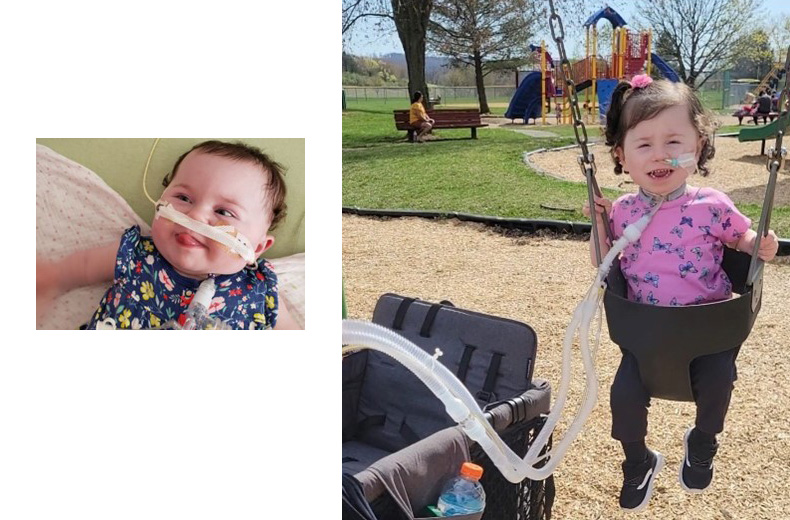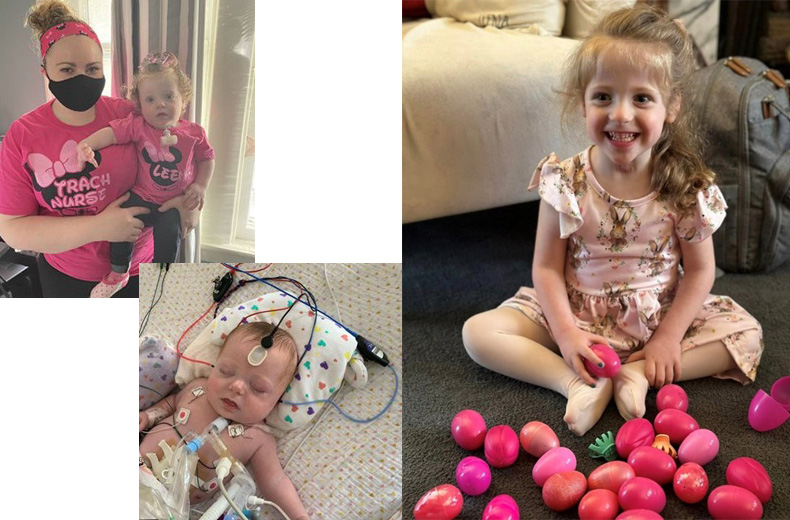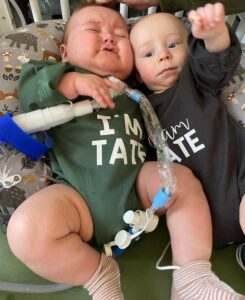To mothers of children with medical complexities, Mothers Day may not mean breakfast-in-bed,
flowers, and fingerpainted cards. Too often, these moms are shuttling back and forth from hospitals and
doctors appointments, providing care to children with trachs, vents, and other medical equipment, and
coordinating the skilled services that their children need. Due to the shortage of home care nurses
across the US, many mothers with medically-fragile children are forced to act as their child’s nurse,
and are not able to focus on their role as a mom.
Below are the stories of two very unique moms. Alexis Stull and Melissa Maranto met in 2020 when they
both had newborn daughters with medically complexities—and both daughters remained in the NICU
for months after their birth – even after doctors medically cleared them for discharge. Hospitals
require most NICU children to be discharged with home nursing. When there are no nurses available to
take on these cases, these children are often “stuck” in the NICU until home nursing is secured.
Alexis and Melissa struggled to bring their babies home due to this shortage. Most nurses opt not to
work in home care because they can earn much more in hospitals and nursing homes. As a result,
thousands of parents across the US experience what Alexis, Melissa, and their partners and daughters
did.
To solve for this home care nursing shortage crisis, wages for home care nurses must be made
competitive. Alexis’s and Melissa’s stories showcase the dire need for fair funding for home nursing
programs. Without reliable home care, these moms are unable to be moms – they must be nurses.
Mom Melissa & daughter Lacey

Lacey in the NICU (L) , Lacey’s First Time at the Park This April 2023 (R)
Lacey was born in February 2020 and did not leave the NICU for 511 days – well after her first birthday,
and months after doctors cleared her for discharged. Hospital staff informed Melissa that if home
nursing could not be secured, Lacey would likely need to be admitted to a long-term pediatric facility.
“It’s like a nursing home for babies – a place that no parent would ever want their child to be,” says
Melissa.
Lacey was finally able to come home with a home care nurse, but due to the workforce
shortage—Melissa still struggles to access home nursing for Lacey. “We live near a hospital facility, and
they can compete for all the nurses. There is rarely a qualified nurse available in home care, because
they all go to work at the hospital or as a traveling nurse—both of which pay more than home care,” she
says.
As nurses come and go from home care quickly to take on better-paying work elsewhere, Lacey’s
continuity-of-care has been affected. At three-and-a-half years old, she is standoffish and can even lash
out when a favorite nurses leave and she meets a new one. “It’s like a revolving door for her, and it
affects her ability to build trusting relationships,” says Melissa.
Through the fall and winter, there were no nurses available to take on Lacey’s case at all, and Melissa
had to provide all of Lacey’s care for 9 months. As of February, Melissa has thankfully had a steady
team of two nurses that provide most of Lacey’s care during the week. Lacey has warmed up to them both, and Melissa now has the capacity to take care of herself and her responsibilities as a mom, while
the nurses take on Lacey’s skilled medical care. But given her experience with nurses coming and going,
Melissa worries when one of them may leave to take on better-paying work elsewhere.
Since she has been home, Lacey has made major strides. She breathes on her own during the day, and
only uses her oxygen tank at night. Last week, Lacey started a school program, where she goes with her
daytime nurse and receives the skilled physical, occupational, and speech therapies she needs.
When asked what she wishes the public and lawmakers knew about home nursing care and how it
affects families like hers, Melissa said that she wants “people to know that these babies stuck in
hospitals shouldn’t be there. Kids deserve to grow up at home, and a proper home nursing workforce
is necessary—for these children, but for their parents and families too.”
Melissa and many other moms, dads, and families are asking Pennsylvania lawmakers and others around
the country to increase funding for home care, as this funding has stagnated and fallen way behind costs
of living, inflation, and more. Hospitals can pay nurses significantly more in wages, and home care
agencies can’t compete for the quality, reliable nurses that children and families need. Until state
governments take action, children like Lacey will continue to get stuck in NICUs for unnecessary
lengths of time, and will be at risk being home without the skilled care they are authorized to receive.
“Home nurses provide one-on-one care and keep kids at home and out hospital rooms. They do
everything facility nurses do and they keep families together. They deserve a fair wage.”
Mom Alexis & daughter Leena

Leena at Age 1 at Home with her Nurse Hailey (L) , Leena in the NICU (C) , Leena now, After her Fistula Closure Surgery in April 2023 (R)
Leena came home from the Children’s Hospital of Philadelphia (CHOP) NICU at 9 months old, after a
two-month delayed discharged due to the home nursing shortage. At that time, Leena was on a
ventilator 24/7 and was unable to sit unassisted or roll over. Today, at three-and-a-half, Leena is
running, jumping, talking—and even learning how to swim. She no longer needs a ventilator or trach,
and she successfully had surgery to close her fistula in November 2022!
Leena’s parents are grateful for the team of nurses that helped Leena during her first years at home.
They even have two of the same nurses that were there when Leena first came home, which is highly
unusual. Turnover for home care nurses is high, as many home care nurses leave to take better-paying
jobs elsewhere. But this consistency in Leena’s care has not only helped her to stay safe and healthy at
home alongside her family—but it has allowed her to learn, grow, and love. “Leena’s nurses have
become members of the family,” says Alexis. “They are just as heavily invested in her physical and
mental success and growth as my husband and I are.”
Even though Leena’s medical needs are less acute now than in years past, Alexis is still passionate about
advocating for children born with medical complexities because of her experience, and what the home
nursing shortage and resulting domino effect means for families. “Not only does the home nursing
workforce shortage prevent children from going home, but it prevents other newborns that need
those NICU and step-down unit beds from accessing them. When NICU beds are full at large and
specialized hospitals, then parents are forced to send their complex children to less advanced
hospitals—potentially compromising their ability to get the best care possible,” says Alexis.
Additionally, like in Melissa and Lacey’s case, the lack of nurses can create a turnover situation that
leave parents in a position to constantly train new hires, and have no peace-of-mind to leave their children at home or in school with the nurse while they work or take care of their responsibilities. “My
husband and I both work full-time, which we would not be able to do without our nurses. These children
need to be able to trust their nurse – they cannot be placed in a position where there is a different nurse
every week. Having consistent reliable nursing care is key – and that can not happen unless legislators
increase funding so that home care nurses can make a competitive wage and really be attracted to
stay in the home care field.” Without enough home nurses in the field, parents and children experience
gaps in care—and children are placed at unnecessary risk being left in situations where there is no nurse
available for days or even weeks.
Home nursing is a lifeline for millions: It not only helps children coming out of NICUs, but it also allows
medically-complex individuals to live independently in their own communities. With medical
technologies allowing more people to go home “sicker and quicker,” the more home nursing will be in-
demand. But without a fair funding commitment from state and federal legislators, nurses will always
be attracted to better paying jobs in hospitals and other facilities. Moms undoubtedly have a major
role to play in their children’s lives – and that is to be a mom, not a specially-trained nurse. Now is the
time to equalize access to home nursing for the many future children that will need this care to go from
the NICU to the place they ought to live and grow up: in their own homes.







